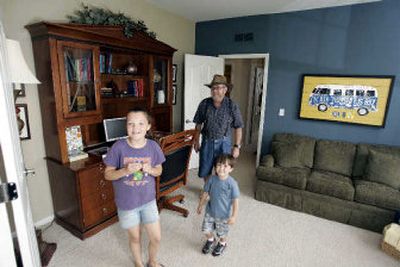Catering to active adults

BROWNSTOWN TOWNSHIP, Mich. – Nina and Tom Szuch’s Orlando, Fla., home might seem like a cozy retirement spot.
But the couple, both in their 60s, have missed their family and friends during a six-year stay in the Sunshine State.
Now they’re ready to head north – way north.
Michigan probably isn’t on the short list for most active seniors looking to buy a retirement home, but thanks to the increasing efforts of big homebuilders, formerly out-of-the-way states now are in play for 78 million members of the baby boom generation who are reaching their golden years. They are being drawn to large housing developments that are packed with hundreds of homes, golf courses, walking trails and community centers.
And as the prices of homes in traditional retirement areas have become more expensive, many older adults are choosing to live in the community-oriented developments in their home state.
Such developments – known in the housing industry as active adult communities – typically are found in destination states such as Florida, Nevada and California, but Pulte Homes Inc. is opening similar communities across the nation with plans to build 100 of them in 24 states by 2008. Pulte leads the active adult segment among major developers, but other companies – including Centex Corp., DR Horton Inc., Lennar Corp. and Toll Brothers Inc. – have also tapped the market.
“It’s no longer a fringe component,” said Dave Schreiner, Pulte’s vice president for active adult business development. “It’s really become a central part of meeting the needs of the home-buying public.”
Bloomfield Hills, Mich.-based Pulte, the nation’s No. 2 homebuilder by units, says it should record significant growth in its active adult sales, despite cutting full-year forecasts last month due to rising interest rates and other hints of a cooling housing market. Pulte, which had $14.7 billion in revenue in 2005, competes in a number of homebuilding segments, but the active adult category provides its largest source of revenue.
With a steady stream of baby boomers living longer, the market for these communities is accelerating to an all-time high, Schreiner said.
Del Webb, Pulte’s active adult brand, represented 39 percent of the 45,630 total units sold by the homebuilder last year, up from 33 percent in 2004. Pulte acquired Arizona-based Del Webb Corp. in a $1.7 billion deal in 2001, when the two companies combined had only 15 active adult communities open for sale in seven states.
Pulte now has 47 Del Webb communities open for sale in 17 states and plans to expand to New Mexico, Minnesota, Indiana, New York, Delaware, Tennessee and Georgia in the next two years. Pulte hires lifestyle directors, handles the landscaping and snow removal and sets up a homeowners association to run each community.
The Szuchs recently toured a 2,200-square-foot, three-bedroom home a community being built by Pulte in the Detroit suburb of Brownstown Township. The development will feature more than 600 homes, a 14,700 square-foot recreation center, walking trails, tennis courts and two swimming pools when construction is completed in the next three to five years.
“We really missed our family, and here they have a lot for seniors, and it’s all so appealing,” Nina Szuch said as she looked at the one-story home in Bridgewater, one of two such Pulte-run Michigan communities, which require 80 percent of its population to be 55 or older.
Pulte estimates 20 percent of its new residents in these communities come from out of state, but the company mostly wants to attract local seniors who want to downsize their large, empty-nest homes and be close to their families. Schreiner said many seniors pay in cash or are invested in interest-driven assets, so the group is not as affected by rising interest rates like much of the housing market.